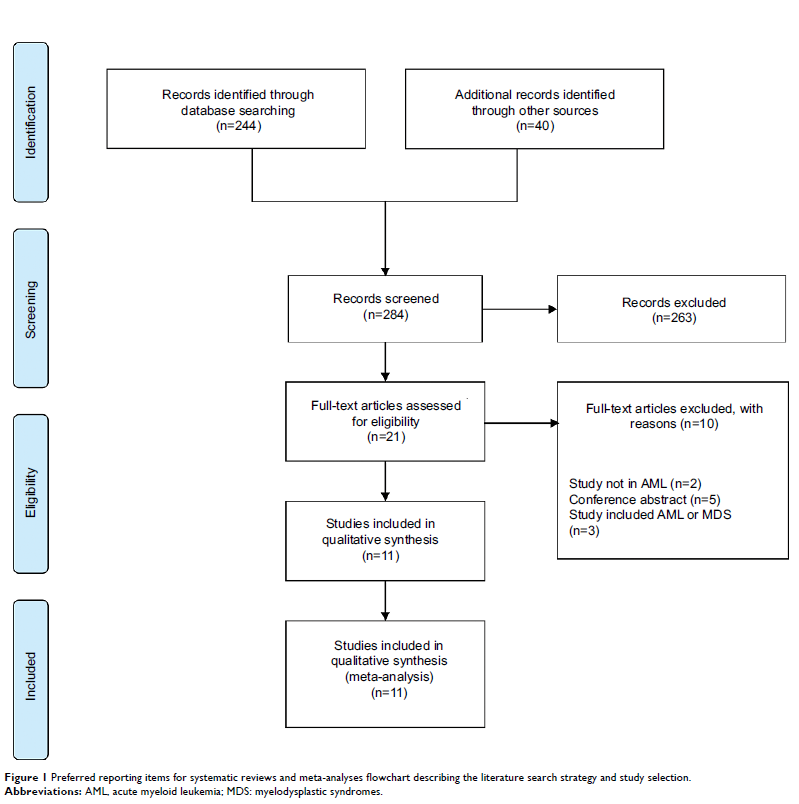108605
论文已发表
注册即可获取德孚的最新动态
IF 收录期刊
- 3.4 Breast Cancer (Dove Med Press)
- 3.2 Clin Epidemiol
- 2.6 Cancer Manag Res
- 2.9 Infect Drug Resist
- 3.7 Clin Interv Aging
- 5.1 Drug Des Dev Ther
- 3.1 Int J Chronic Obstr
- 6.6 Int J Nanomed
- 2.6 Int J Women's Health
- 2.9 Neuropsych Dis Treat
- 2.8 OncoTargets Ther
- 2.0 Patient Prefer Adher
- 2.2 Ther Clin Risk Manag
- 2.5 J Pain Res
- 3.0 Diabet Metab Synd Ob
- 3.2 Psychol Res Behav Ma
- 3.4 Nat Sci Sleep
- 1.8 Pharmgenomics Pers Med
- 2.0 Risk Manag Healthc Policy
- 4.1 J Inflamm Res
- 2.0 Int J Gen Med
- 3.4 J Hepatocell Carcinoma
- 3.0 J Asthma Allergy
- 2.2 Clin Cosmet Investig Dermatol
- 2.4 J Multidiscip Healthc

已发表论文
来那度胺治疗急性髓性白血病的疗效和安全性: 系统综述和荟萃分析
Authors Xie CH, Wei M, Yang FY, Wu FZ, Chen L, Wang JK, Liu Q, Huang JX
Received 19 March 2018
Accepted for publication 5 July 2018
Published 18 September 2018 Volume 2018:10 Pages 3637—3648
DOI https://doi.org/10.2147/CMAR.S168610
Checked for plagiarism Yes
Review by Single-blind
Peer reviewers approved by Dr Colin Mak
Peer reviewer comments 4
Editor who approved publication: Professor Nakshatri
Background: Lenalidomide is
effective for the treatment of low-risk myelodysplastic syndromes with deletion
5q abnormalities. However, whether lenalidomide leads to a significant
improvement in treatment response and overall survival (OS) in cases of acute
myeloid leukemia (AML) remains controversial. A systematic review and a
meta-analysis were performed to evaluate the efficacy and safety of
lenalidomide in the treatment of AML.
Methods: Clinical studies were identified from the Cochrane Central Register of Controlled Trials, PubMed, Embase, and ClinicalTrials.gov. Efficacy outcomes included overall response rate (ORR), complete remission (CR), and OS. Safety was evaluated based on the incidence of grade 3 and 4 treatment-related adverse events (AEs).
Results: Eleven studies were included in our meta-analysis; collectively these studies featured 407 AML patients. Pooled estimates for overall ORR and CR were 31% (95% CI: 26%–36%) and 21% (95% CI: 16%–27%), respectively. Thrombocytopenia, anemia, neutropenia, and infection were the most common grade 3 and 4 AEs.
Conclusion: Lenalidomide may have some clinical activity in AML, but the population that would benefit from lenalidomide and incorporating lenalidomide into combination drug strategies need to be better defined.
Keywords: azacitidine, cytarabine, immunomodulatory agent, cytogenetic risk
Methods: Clinical studies were identified from the Cochrane Central Register of Controlled Trials, PubMed, Embase, and ClinicalTrials.gov. Efficacy outcomes included overall response rate (ORR), complete remission (CR), and OS. Safety was evaluated based on the incidence of grade 3 and 4 treatment-related adverse events (AEs).
Results: Eleven studies were included in our meta-analysis; collectively these studies featured 407 AML patients. Pooled estimates for overall ORR and CR were 31% (95% CI: 26%–36%) and 21% (95% CI: 16%–27%), respectively. Thrombocytopenia, anemia, neutropenia, and infection were the most common grade 3 and 4 AEs.
Conclusion: Lenalidomide may have some clinical activity in AML, but the population that would benefit from lenalidomide and incorporating lenalidomide into combination drug strategies need to be better defined.
Keywords: azacitidine, cytarabine, immunomodulatory agent, cytogenetic risk
